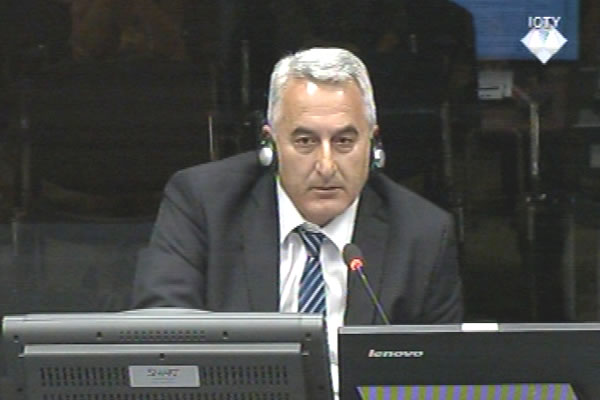Home
COMMANDER'S KNOWLEDGE OF GENEVA CONVENTIONS PUT TO TEST
Mladic’s defense witness Svetozar Guzina commanded a VRS battalion stationed in Nedzarici. According to him, he and indeed all the Serb soldiers in the Sarajevo theatre of war strictly observed the Geneva Conventions. This prompted the presiding judge to test the witness’s knowledge. Guzina eventually admitted his knowledge of the Conventions was pretty basic. Before the war he was in the catering business and was not a trained officer
 Svetozar Guzina, defence witness at Rako Mladic trial
Svetozar Guzina, defence witness at Rako Mladic trial In the second session at Ratko Mladic's trial today, Svetozar Guzina began his evidence in Mladic’s defense. During the war, Guzina was the commander of the 1st Battalion in the VRS Ilidza Brigade. Defense counsel Stojanovic read out the summary of the witness’s statement to the defense team. In it the witness repeated the key arguments from his evidence in Radovan Karadzic’s defense. The witness described the conduct of the Bosnian Serb army in the Sarajevo battlefield in glowing terms.
In the summary, the witness stated that before the war he had ‘a catering business' in Sokolovic Kolonija in Sarajevo. The witness became aware of the fact that as early as in the spring of 1991 Muslims started getting weapons and gearing up for war. When the first inter-ethnic incidents occurred, the witness fled to Ilidza where he joined the Bosnian Serb army and became a battalion commander in Nedzarici. His unit, the witness said, complied with ‘the strict orders’ they had been given not to shoot at civilians in the city. Guzina claimed that he was 'not aware of a single instance’ of targeting the citizens in Sarajevo by sniper or artillery fire.
The witness claimed that his unit wasn’t responsible for the incident that happened on 26 June 1994, which is listed in the indictment. Sanela Muratovic, a 16-year old girl, was hit in shoulder by a sniper, as she walked down Djure Jaksica Street with a friend. The witness explained that his unit did not deploy any snipers in that area. He couldn’t understand why civilians walked along the demarcation line while the fighting was going on, implying that Sanela was wounded in the cross-fire.
According to Guzina, his unit in Nedzarici never prevented the passage of humanitarian aid convoys into Sarajevo. Defense counsel Stojanovic showed a document of 15 May 1993 in which the Sarajevo-Romanija Corps relays the order of the VRS Main Staff to subordinate units ‘not to prevent humanitarian convoys from passing through’. All the soldiers in the Corps knew about the order and implemented it, Guzina explained.
Presiding judge Orie noted that the same document ordered the troops to observe the Geneva Conventions. The presiding judge asked Guzina whether he was familiar with the Conventions, as he was supposed to implement them. ‘Roughly speaking, I knew the basics’, Guzina replied, adding that the conventions related to the rights of the prisoners of war. Asked to name those rights, the witness said that prisoners must be ‘given food, water, must be protected from further suffering and transferred to relevant bodies which then take further action'.
The witness gave an example: on one occasion, ‘Muslim children from Butmir’ entered into his brigade’s area of responsibility and were then escorted back. The presiding judge interrupted the witness at that point. He was ‘surprised by the witness's idea of who can be considered as a prisoner of war’, given that he had mentioned ‘Muslim children’ in that context. Guzina first claimed it was all a misunderstanding, but then he admitted that he didn't really ponder the issue of prisoners of war and their rights. After all, he ‘had a restaurant’ before the war and was not a professional officer.
Tomorrow, the prosecution will cross-examine the restaurateur turned battalion commander.
Linked Reports
- Case : Mladic
- 2014-06-06 ‘HONEST PEOPLE’S CLUB’ AGAINST PARAMILITARY FORMATIONS
- 2014-06-06 PROSECUTION: ‘WITNESS IS INCONSISTENT AND INCREDIBLE’
- 2014-06-05 SEVERED HEADS ALL OVER SARAJEVO
- 2014-06-11 TWO 'BAR TRUTHS’ ABOUT ARMING OF SERBS AND MUSLIMS
- 2014-06-12 WHO OCCUPIED SARAJEVO?
- 2014-06-13 ‘IF ELVIS PRESLEY IS A STAR, I AM A 'GRANDE' STAR’, SAYS MLADIC
